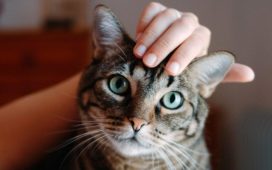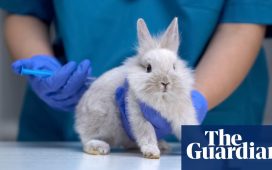Retailers have been accused of doing too little to warn customers about recalled cat food that has been linked to the deaths of potentially thousands of pets, prompting concern that some remains on sale in shops.
As more details emerged of the scandal, cat owners spoke of their distress at watching their pets suffer and die.
Several owners shared evidence that suggested branches of Sainsbury’s continued stocking the recalled food even after investigators raised concerns that it might be the source of an outbreak of pancytopenia, a disease that is often fatal in cats.
The Royal Veterinary College has logged 528 cases and 335 deaths, but said the true numbers may be significantly higher.
An investigation by the Food Standards Agency, which began on 24 May, has yet to reach a conclusion about the cause of the deaths, but it has focused on the possibility of dangerous mycotoxins in batches of Applaws, Ava and Sainsbury’s hypoallergenic cat food.
In one picture shared with the Guardian, hypoallergenic cat food appeared to be included on Sainsbury’s “last chance to buy” bargain shelf, after the 16 June recall.
In correspondence between one cat owner and a senior Sainsbury’s executive, the supermarket appeared to acknowledge the problem, saying that all bags of the food “have now been taken off the shelves”.
Several cat owners also shared photographs of Sainsbury’s cat food aisles in which signage alerting customers to the product recall did not appear to be prominently displayed, if at all.
Another shared an email about the product recall which she said was the only correspondence she had received from the supermarket, sent on 16 July. Other customers said they never received an email, despite being Nectar card users. Another said he first alerted Sainsbury’s to concern about the food on 22 April. Emails shared with the Guardian show that the supermarket answered that it did not believe its cat food was responsible.
“We are in touch directly with customers where we have their contact details,” said a spokesperson for the supermarket.
“We have also displayed the recall alert on our website and in store at our customer service desk and where the product is usually stocked on shelf.”
Members of a 12,000-strong Facebook group set up for people who have lost cats to pancytopenia, or who are worried about the issue, said Pets at Home had responded better to the crisis, by offering refunds, alerting people quickly and paying some vet bills.
One user shared an exchange with Pets at Home in which the retailer admitted that one of its stores, in Stockport, accidentally offered the recalled product for sale on 15 July, but the retailer said that after the recall the product barcode had been deleted so it cannot be bought and there were no sales at the Stockport site.
A Pets at Home spokesperson said: “We did everything we could to make consumers aware of the issue, via our website and social channels and by writing directly to anyone who had bought one of these products in the previous 12 months.”
Two separate cat owners, Steven Barrett and Hillary Cannon, bought Applaws cat food from Amazon. The online retailer said it removed the food from sale, emailed a warning to buyers and provided a full refund.
But both questioned why the online retailer has not published an alert on the cat food section of the site, to raise awareness among any cat owners looking to restock.
According to one Facebook group member’s picture, at least one unnamed independent retailer is still stocking the recalled food, all of which was manufactured on behalf of retailers by Fold Hill Foods.
Barrett, whose cat, Freyja, died this week, said: “There should be an independent public inquiry into how this outbreak happened. If it does turn out to be an issue in the food supply chain, it’s a national scandal.”
Distraught cat owners in the Facebook group backed the call and said more should have been done to warn people.
Sign up to the daily Business Today email
Sarah Baker, a student paramedic from Leicestershire, said she and her flatmate lost two of their six sphynx cats, 17-week-old Igor and 18-month-old Spider.
“I just think it’s disgusting that there’s no awareness,” she said. “It’s OK if you’ve got social media but there must be hundreds of people feeding their cats without being aware.”
Dr Vanessa Howie, the head of clinical services at Cats Protection, said alerting the public to the product recall in a timely fashion was crucial because the disease can be irreversible if caught too late. “If the toxin has stopped blood cell production altogether, potentially nothing can be done to kickstart it again,” she said.













